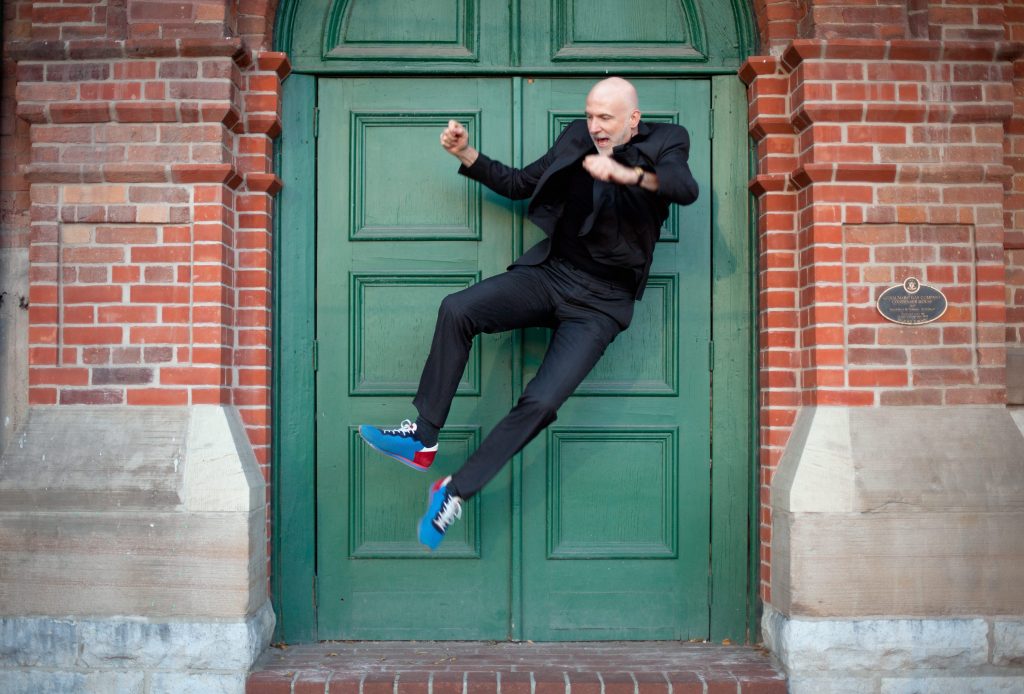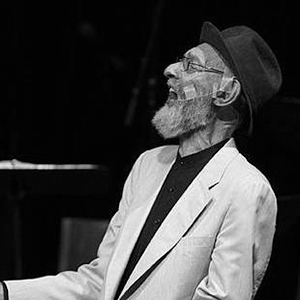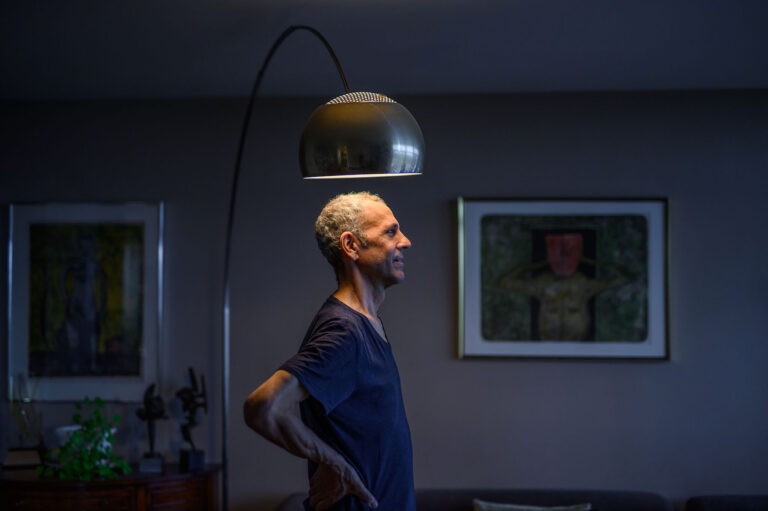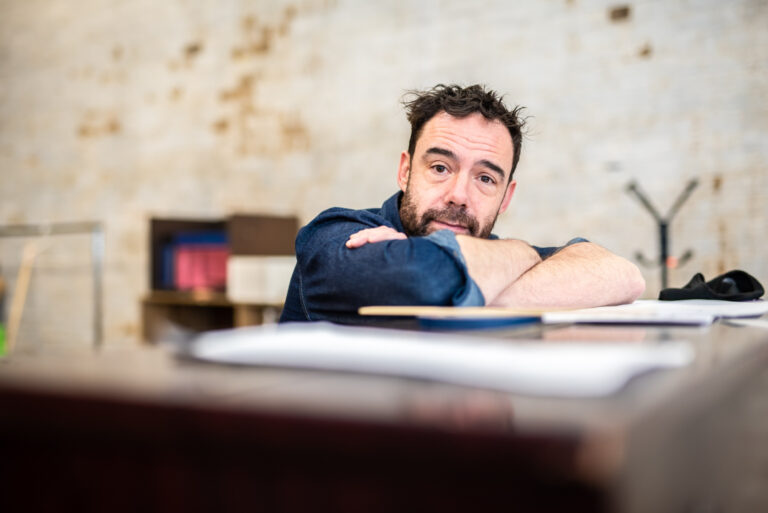Matthew Jocelyn’s Mark on Canadian Stage
Matthew Jocelyn is embarking on his last season as artistic director of Canadian Stage. He’s had a nine-year run, though somehow it seems shorter. It’s been a good term of office, if a sometimes underrated one: controversial in some quarters, but successful in its aim of bringing a flavour to Toronto that wasn’t there before, certainly not at this address.
Jocelyn seems to be leaving in accordance with his own mental schedule. “I’ve always thought,” he told me over coffee on what for him was otherwise a day of budget meetings, “that somewhere in the eight-to-twelve year region is what I’d like to do. I think, if you’re running a public institution, that’s the best-before date. We shouldn’t take ownership of something that’s publicly funded.”
This particular institution is a two-headed monster, operating at two neighbouring locations: the barn-like Bluma Appel and the humbler Berkeley Street. Each comes with its own built-in challenges: visual at the Bluma, acoustic at the Berkeley. Jocelyn’s regime cannot be said to have consistently overcome either of them, but one of its signal achievements has been to end the hiving-off of all even vaguely experimental work to the smaller space.

Gil Garratt and Gemma James Smith in The Game of Love and Chance, directed by Matthew Jocelyn. Photo by Luce Tremblay-Gaudette
No time was lost in putting this principle into practice. In some ways my favourite production of Jocelyn’s tenure, both for what it achieved and what it promised, was the first, back in 2010: Fernando Krapp Wrote Me This Letter. It was a fairly recent play by the German writer Tankred Dorst and Jocelyn directed it himself, at the Bluma. The choice of script was in line with his stated intention of bringing a “European aesthetic” to Toronto, in terms of play and style of staging. Jocelyn is a Canadian who had spent most of his previous career in Europe; he went there—initially to England, to study at Oxford—in 1980, and didn’t return until 2009. He spent twenty-seven of those intervening years in France, but also worked in Belgium, Switzerland, and Germany. He was involved, in his own words, in “marginal, experimental work” and also in the mainstream: “I lived the poles—the gutter and the great opera houses.” (You might also say he lived the Poles, as he spent time in Poland with the legendary “poor theatre”—actually rather well-subsidised—of Jerzy Grotowski.)
So what is this style, European or otherwise, that Jocelyn has endeavoured to bring to Canadian Stage? He described it to me as one that “gives preponderance to the human body as a holder of expression.” I asked if that meant the body rather than the voice, and he confirmed that it did. I then pointed out that he was nonetheless drawn to rather literary texts, from Fernando Krapp, his first production, to the one that will be his last and that he is currently rehearsing: Heisenberg, by the hot British playwright Simon Stephens. He agreed with that, too. “Despite appearances,” he said, laughing, “I’m a classicist.”

Molly Parker in Harper Regan, directed by Matthew Jocelyn. Photo by David Hou
I believe him. In the theatrical world outside Canadian Stage, he’s known as a director, even as a writer, of operas; his libretto for an operatic Hamlet was a recent success at the celebrated Glyndebourne Festival in the UK. His productions back at base include a classic French comedy, Marivaux’s The Game of Love and Chance in 2012. It was not, admittedly, a good production. The “human body” mainly made itself felt as a display of wearisome acrobatics, presumably meant to evoke the Commedia dell’Arte; the words didn’t fare too well either.
The show is worth recalling because it shows Jocelyn’s aesthetic going wrong, just as Fernando Krapp had shown it going right. There was a lot of acrobatic acting in Krapp too, but it was funny and pointed and it illuminated the characters and situations it depicted. It extended to the sets and props as well; in my review I described how “a bear-skin, with head still attached, descends from above and obligingly arranges itself into a rug.” That first season’s playbill also prompted me to quip that Canadian Stage’s new policy was to produce European plays with long titles (as opposed to the previous management’s preference for American plays with short ones). Krapp was followed by The Cosmonaut’s Last Message to the Woman He Once Loved in the Soviet Union, an even better play (though a less good production, not by Jocelyn) and, as the work of the Scottish playwright David Greig, one that may also count as European.

Yanna McIntosh and Laura Condlln in This, directed by Matthew Jocelyn. Photo by Bruce Zinger
Jocelyn regime’s record with new Canadian plays is not great, but I cannot hold that too much against it; there are plenty of other Toronto theatres dedicated to giving them houseroom. Probably the best play Jocelyn has done by a Canadian (and another that he himself directed) was This by Melissa James Gibson who, though born here, is really a New York writer. That, of course—or maybe I should say This, of course—showed the fascination with long titles to have been short-lived.

Leslie Hope in Liv Stein, directed by Matthew Jocelyn. Photo by Cylla von Tiedemann
Jocelyn says that he has “a theatrical love-affair with Stephens. He’s engaging, thoughtful, theatrically daring but not gratuitously so. It’s never effect for effect’s sake. While what he says about people, and their interconnectedness, is full of unexpected insights. And I get to spend concentrated time with two of our country’s greatest actors [Carly Street and David Schurmann].” He promises us “a very naked production … a small revolve, my personal choice … two chairs and a bench.” I guess that might be called European; the play’s New York production was apparently “more chic. Ours is fairly minimal. It’s in the round, the audience on four sides.” I don’t think I’ve seen that formation at Berkeley Street before.
At least one other British script has been a regime triumph: London Road, the extraordinary “verbatim musical” that, under Jackie Maxwell’s direction in 2014, brought together eleven of our finest actor-singers in one of the most stunning ensemble productions I have ever seen. It was hypnotic from the first note. I doubt if the original National Theatre production was better. (The film version, certainly, was nothing like as good.)
Then of course, and vital to the organization’s image, there has been Canadian Stage’s hosting of, and interaction with, other companies, and its embrace of music theatre and, especially, dance. It has given Robert Lepage a long-overdue Toronto home, thereby bringing us the scintillating Needles and Opium and the marvellous 887. It has showcased the work of Kim Collier, whose Tear the Curtain!, playfully blending stage and film, gave metatheatre a good name. It has brought us—closest, I fancy, to Jocelyn’s own heart—the dance-centred work of Crystal Pite, whose Betroffenheit will make its third appearance, rounding off the 2017/18 season. (Vital link between the two last-mentioned shows: actor/writer/provocateur Jonathon Young.) Bringing us these troupes from the rest of the country has meant that Canadian Stage could, at last, live up to its name. And it has given houseroom to some of Toronto’s own most valuable groups: to Company Theatre (the super-memorable John) and to the newly re-named Musical Stage Company (the super-promising Life After).

David Schurmann and Carly Street in Heisenberg. Photo Cylla von Tiedemann
There have also been a fair number of damp squibs and wilful obscurities. But the good outweighs the bad. As for what happens next: the search for the next artistic director is not yet officially on, but we are told it will be international. This means that some national defences have gone up. Jocelyn responds that he’d “love to think that there’s a ferocious and exciting competition for the job. It’s a sign of success that it’s attracting international attention. And perhaps the best way to get the best Canadian is to make it as wide a search as possible.” He also says: “Artistic directors aren’t necessarily directors of plays. It could be a producer-like person.”
As for his own future: “I’m turning sixty. I think I have one other large project in me. Something different.” He adds, cryptically, “I’m hungry to not know what I’m doing next.”
Matthew Jocelyn’s final directorial production at Canadian Stage, Heisenberg, runs until December 17.
For tickets or more information, click here
In an earlier version, we mistakenly referred to Kim Collier’s Tear the Curtain! as Torn Curtain. We regret this error.











Comments